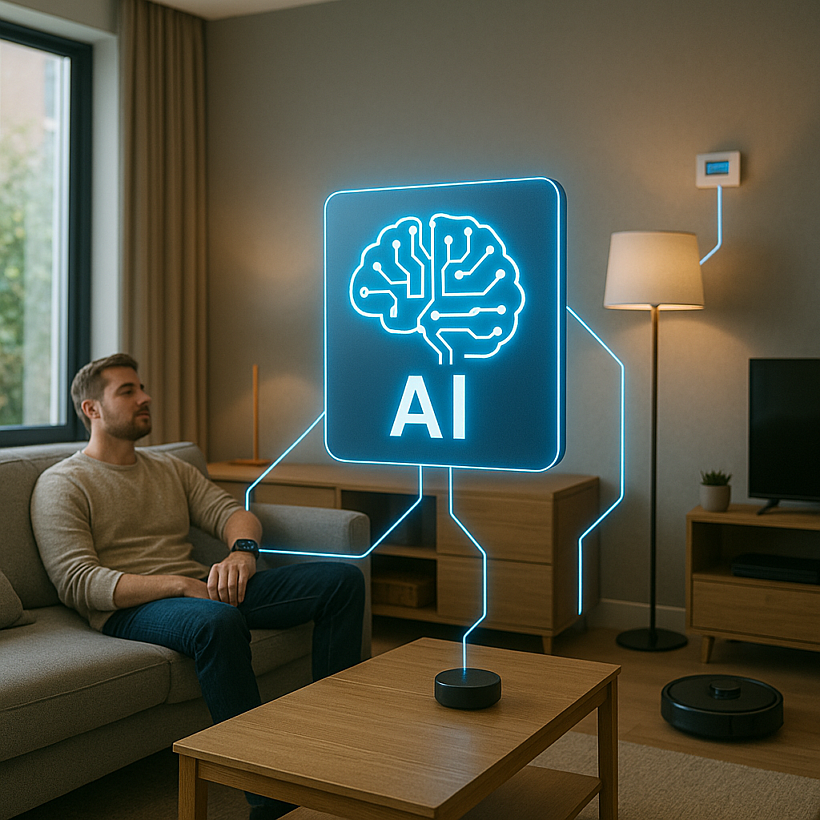
AI-Powered smart homes: What to expect in the next decade
The intersection of artificial intelligence and home automation is reshaping our domestic lives. As we look toward 2035, the evolution of AI-powered smart homes promises to fundamentally transform how we live, work, and interact with our living spaces.
Where we are today
Today's smart homes primarily operate on basic automation and voice commands. However, we're already witnessing the shift from simple automated tasks to truly intelligent home systems that learn and adapt to our behaviors.
What started with basic motion sensors and programmable thermostats has evolved into sophisticated systems that understand and anticipate our daily routines.

Key developments on the horizon
1. Predictive AI assistance
The next generation of smart homes will evolve from reactive to predictive systems. Using advanced machine learning algorithms, these systems will analyze patterns in our daily lives to anticipate needs before they arise. Imagine walking into your home after a stressful day at work, and your house has already adjusted the lighting, temperature, and ambient sound to help you relax – all based on data from your wearable devices and previous behavior patterns.
2. Advanced health monitoring
Our living spaces will become active participants in our health management journey. Through a network of unobtrusive sensors and AI-powered analysis, homes will monitor vital signs and behavioral patterns to detect potential health issues early. This technology will be particularly valuable for aging populations, allowing more seniors to live independently while maintaining safety and peace of mind for their families.
3. Seamless Integration
The fragmented smart home ecosystem of today will give way to unified, seamless integration. AI will serve as the bridge between different devices and systems, creating a truly cohesive living environment. This means no more juggling multiple apps or dealing with compatibility issues – your home will function as one intelligent entity.
Privacy and security: Balancing Innovation with Protection
As our homes become more intelligent, the question of privacy and security takes center stage. The challenge lies in balancing the benefits of AI-powered convenience with the fundamental right to privacy in our most intimate spaces. Future smart homes will incorporate advanced encryption and authentication methods that go beyond today's basic security measures.
AI systems will become more sophisticated in distinguishing between normal and suspicious activities, offering personalized security protocols for different family members. However, the real innovation will be in how these systems handle and process data. Instead of sending all information to cloud servers, edge computing will allow more processing to happen locally, keeping sensitive data within the home's network.
Manufacturers and developers are already working on "privacy by design" principles, where data protection isn't an afterthought but a fundamental aspect of every smart home feature. This includes giving homeowners complete transparency and control over what data is collected and how it's used.

Environmental impact: The green revolution
Lastly, the environmental impact of AI-powered homes will be most transformative, so of course it had to make this list! Smart systems will optimize energy usage with unprecedented precision, reducing waste and lowering carbon footprints significantly. Analyzing weather patterns, solar panel efficiency, and grid demand to make real-time adjustments to home energy consumption.
These systems will go beyond simple energy monitoring – they'll actively participate in community-wide energy management. During peak demand periods, AI will be able to automatically adjust power consumption across neighborhoods, ensuring grid stability while maintaining comfort levels. Water usage will be optimized through smart irrigation systems and intelligent appliances that operate only when necessary.
Perhaps most importantly, AI smart homes will provide their owners with detailed insights into their environmental impact, suggesting improvements and automatically implementing energy-saving measures. This combination of automation and awareness will play a crucial role in meeting global sustainability goals.
In a nutshell
The next decade promises a remarkable transformation in how we interact with our living spaces. AI-powered smart homes will evolve from today's connected devices into truly intelligent environments that enhance our daily lives while protecting our privacy and the planet.
As we move forward, the key will be ensuring these technological advances remain accessible and beneficial to all, not just a privileged few. The smart home of 2034 won't just be a collection of connected devices; it will be a thoughtfully designed ecosystem that enhances human life while protecting our privacy and our planet.
The future of smart homes isn't just about automation, it's about creating living spaces that truly understand and support you and your family. As this technology continues to evolve, we can look forward to homes that don't just house us, but actively help us live better, more sustainable lives.


